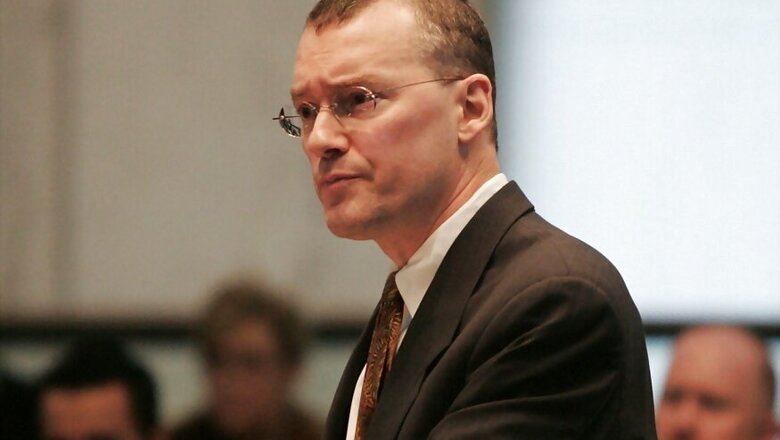
views
On April 14, 2018, sometime between 5:55 am to 6:08 am, a man named David Buckel set himself on fire, in Prospect Park, New York. He was 60-year-old at the time of his death. A champion of gay rights throughout his career as a lawyer, Buckel was an environmental activist, who killed himself to draw people's attention to the issue of climate change.
The Daily News quoted Buckel's handwritten suicide note that said, "I am David Buckel and I just killed myself by fire as a protest suicide."
In another formally typed out letter 'For The Police', that was found alongside the handwritten note, Buckel added," My early death by fossil fuel reflects what we are doing to ourselves...Here is a hope that giving a life might bring some attention to the need for expanded actions, and help others give a voice to our home, and Earth is heard."
In her article titled, 'What Drove a Man to Set Himself on Fire in Brooklyn?' Annie Correal of New York Times noted that "His (Buckel's) suicide is one of the few known cases of political self-immolation in the United States since the 1960s...and perhaps the first one anywhere in the name of climate change."
Through voices of Buckel's friends and family, Correal gives us a sense of what kind of man Buckel was. She lets us know you that he was idealistic, meticulously organized and disciplined, sometimes even stubborn, and self-righteous. But, above all, he was someone who deeply cared about everything and everyone around him, and would always put up a fight in the face of adversity.
While it is hard for anyone to understand why a man like that would feel so compelled to draw attention to a particular topic that he would be willing to kill himself for it, as you peruse through Correal's piece, it is easier to see why he was worried about Donald Trump's environmental policies and distressed by the state of environmental debates in the United States. Certainly (and thankfully), he wasn't the only in the United States, or in any part of the world, to be worried about environmental changes, and the lack of policies or measures to deal with them.
Unfortunately, Correal's article is perhaps one of the few in-depth pieces written on Buckel's death. Despite the fact, that he killed himself to spark a conversation about climate change, the news of Buckel's death received very few mentions in the United States media and was hardly noticed by the international press. Yes, The Guardian and BBC covered their bases by reporting it. But, that was all and herein lies the problem.
Climate Change has been shockingly underreported by the media across the world and that's a big part of the problem. According to a World Health Report, "between 2030 and 2050, climate change is expected to cause approximately 250 000 additional deaths per year, from malnutrition, malaria, diarrhoea and heat stress."
However, if you are not one of those to rely on predictions, according to the same report, "Globally, the number of reported weather-related natural disasters has more than tripled since the 1960s. Every year, these disasters result in over 60, 000 deaths, mainly in developing countries."
While most of these disasters are covered by the media, they are not reported as climate change stories, which is unfortunate because only during natural disasters do people feel and often can tangibly observe the ravages of Climate Change.
At other times, it is hard for a layman to understand how global warming is happening or sea levels are rising. These are often not-very-easily-perceptible natural phenomenon and come with scientific explanations loaded with jargons. But, the media rarely bothers to report natural disasters in terms of climate change. There are death tolls, human interest stories or accuse-the-government pieces, but hardly a word on climate change.
Buckel may have been the first person to voluntarily give his life for climate change, but, his death certainly isn't the first death that has tried to bring media's and public's attention towards environmental issues.
Closer home in India, every year, many farmers commit suicides because of crop failure, which results due to climate change. However, while it is an understatement to say that Indian media gravely underreports farmers' suicides, even when they do report on the issue, it is mostly focussed on the political blame game aspect of it. Again, hardly anyone pegs it to climate change and how crop failures or lack of rains in the monsoon is related to it.
According to a study by Proceedings of the National Academy of Sciences, Climate change has already caused more than 59,000 suicides in India over the last 30 years.
While the majority of the media turns a blind eye to this, those journalists who report on mining, or fossil fuels often get threatened or even killed for doing so. According to a Reporters Beyond Borders study, in 2015 two Indian journalists were allegedly killed for reporting on illegal mining.
Another reason why climate change issues are not highlighted by the Indian media is that those affected by climate change in India are mostly the marginalized tribes or communities and/or poor section of the society. For example, the ones breathing the toxic air of Delhi are not those who sit in their ac offices but the homeless, who spend their nights and days outside.
While India media has been complacent and shortsighted in reporting climate change, the US media has done worse. The US television channels had a steady rate of decline in climate change reporting from the year 2015 to 2016. In fact, according to a report, broadcast news' coverage of climate change dropped a whopping 66 percent from 2015 to 2016. However, in 2017, the news coverage of climate change soared again, but that was only because of Trump's historic withdrawal from the Paris Climate Agreement.
"Media Matters found that in 2017, 79% percent of the time that corporate broadcast networks spent covering climate change featured actions or statements by the Trump administration. Trump’s withdrawal from the Paris climate agreement was featured in 52% of climate news segments. " reported The Guardian.
How media selects to report on a certain issue (or not report on it)often has a great impact on the public. Media has the power of shaping opinions and perceptions and by choosing to not report on climate change (or reporting it in a wrong way), they are indirectly humouring the false notion of the public that it is not an issue of utmost priority.
Buckel understood the urgent need to address climate change issues, and although the method through which he wanted to bring the issue in public domain may be unfortunate, at least, he tried to start a dialogue about climate change. Let's honour his wishes on World Environment Day and talk about climate change in our new reports, and our coverages as much as possible.

















Comments
0 comment